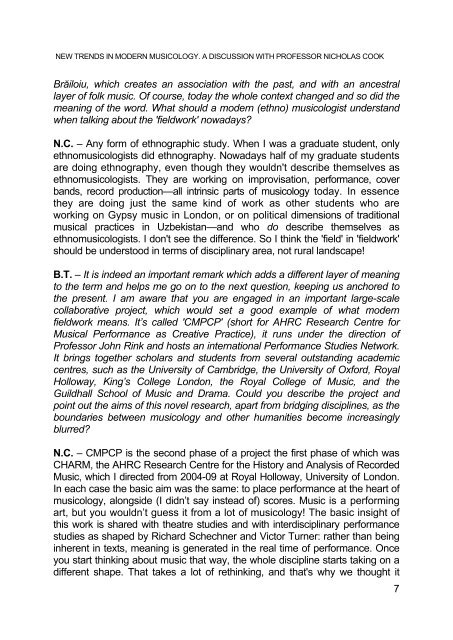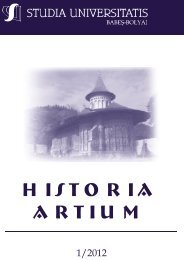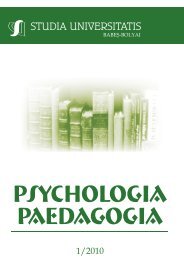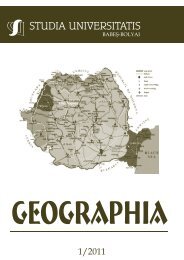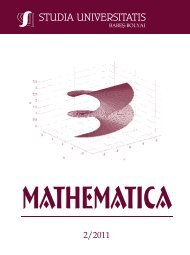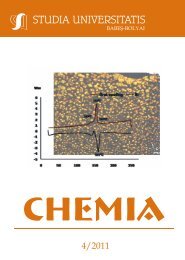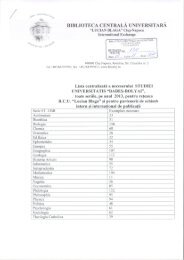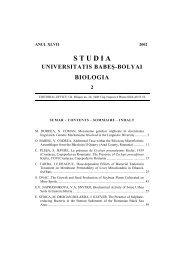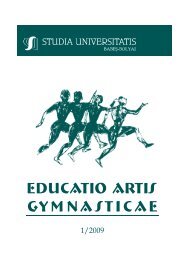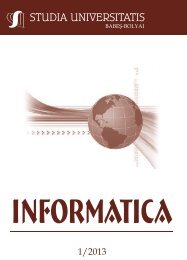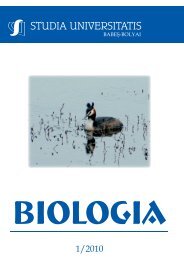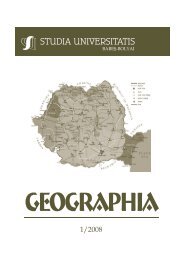- Page 1 and 2: MUSICA 1/2012
- Page 3 and 4: COMPUTER MUSIC CIPRIAN-GABRIEL POP,
- Page 6 and 7: STUDIA UBB MUSICA, LVII, 1, 2012 (p
- Page 10 and 11: NEW TRENDS IN MODERN MUSICOLOGY. A
- Page 12 and 13: NEW TRENDS IN MODERN MUSICOLOGY. A
- Page 14 and 15: NEW TRENDS IN MODERN MUSICOLOGY. A
- Page 16 and 17: NEW TRENDS IN MODERN MUSICOLOGY. A
- Page 18 and 19: NEW TRENDS IN MODERN MUSICOLOGY. A
- Page 20 and 21: NEW TRENDS IN MODERN MUSICOLOGY. A
- Page 22: NEW TRENDS IN MODERN MUSICOLOGY. A
- Page 25 and 26: ISTVÁN ALMÁSI gesellschaftliche S
- Page 27 and 28: ISTVÁN ALMÁSI Gebilde angesehen w
- Page 29 and 30: ISTVÁN ALMÁSI Jahre. Zur Mitwirku
- Page 31 and 32: ISTVÁN ALMÁSI Siebenbürgen an di
- Page 34 and 35: STUDIA UBB MUSICA, LVII, 1, 2012 (p
- Page 36 and 37: TYPICAL WEDDING TUNES OF THE NORTHE
- Page 38 and 39: TYPICAL WEDDING TUNES OF THE NORTHE
- Page 40 and 41: TYPICAL WEDDING TUNES OF THE NORTHE
- Page 42 and 43: TYPICAL WEDDING TUNES OF THE NORTHE
- Page 44 and 45: TYPICAL WEDDING TUNES OF THE NORTHE
- Page 46 and 47: TYPICAL WEDDING TUNES OF THE NORTHE
- Page 48 and 49: TYPICAL WEDDING TUNES OF THE NORTHE
- Page 50 and 51: TYPICAL WEDDING TUNES OF THE NORTHE
- Page 52 and 53: TYPICAL WEDDING TUNES OF THE NORTHE
- Page 54 and 55: STUDIA UBB MUSICA, LVII, 1, 2012 (p
- Page 56 and 57: HYMNS OF REPENTANCE IN THE WORSHIP
- Page 58 and 59:
HYMNS OF REPENTANCE IN THE WORSHIP
- Page 60 and 61:
HYMNS OF REPENTANCE IN THE WORSHIP
- Page 62 and 63:
HYMNS OF REPENTANCE IN THE WORSHIP
- Page 64 and 65:
HYMNS OF REPENTANCE IN THE WORSHIP
- Page 66 and 67:
STUDIA UBB MUSICA, LVII, 1, 2012 (p
- Page 68 and 69:
PHILOKALIA IN MUSIC iubirii” 4 ).
- Page 70:
PHILOKALIA IN MUSIC 18. The sleep,
- Page 73 and 74:
CIPRIAN GABRIEL POP 2. Historic Lan
- Page 75 and 76:
CIPRIAN GABRIEL POP In rendering th
- Page 77 and 78:
CIPRIAN GABRIEL POP Amplitude modul
- Page 79 and 80:
CIPRIAN GABRIEL POP In the work Kla
- Page 81 and 82:
OLGUŢA LUPU eternity and ephemeral
- Page 83 and 84:
OLGUŢA LUPU But its heyday, a time
- Page 85 and 86:
OLGUŢA LUPU - the poem Vox maris 1
- Page 87 and 88:
OLGUŢA LUPU suggest the finest nua
- Page 89 and 90:
OLGUŢA LUPU Mircea Eliade’s obse
- Page 91 and 92:
OLGUŢA LUPU plants and minerals ar
- Page 93 and 94:
OLGUŢA LUPU The Metaphor of Water
- Page 95 and 96:
OLGUŢA LUPU remains “sheltered i
- Page 97 and 98:
OLGUŢA LUPU Enescu, a joyous meeti
- Page 99 and 100:
OLGUŢA LUPU uselessness, this sacr
- Page 101 and 102:
OLGUŢA LUPU Using the metaphor of
- Page 103 and 104:
OLGUŢA LUPU Noica, Constantin, Sim
- Page 105 and 106:
OANA ANDREICA from Bach to Berg. Di
- Page 107 and 108:
OANA ANDREICA phenomenon: the quota
- Page 109 and 110:
OANA ANDREICA and the Shostakovich
- Page 111 and 112:
OANA ANDREICA Ex. 4 Quotation of La
- Page 113 and 114:
OANA ANDREICA In ms. 15-16, with em
- Page 115 and 116:
OANA ANDREICA A variation of Lasso
- Page 118 and 119:
STUDIA UBB MUSICA, LVII, 1, 2012 (p
- Page 120 and 121:
NICOLAS ASTRINIDIS (1921-2010): COM
- Page 122:
NICOLAS ASTRINIDIS (1921-2010): COM
- Page 125 and 126:
MARTA CÎRLEJAN began along with ba
- Page 127 and 128:
MARTA CÎRLEJAN ensemble, to streng
- Page 129 and 130:
MARTA CÎRLEJAN Pleyel. Their works
- Page 131 and 132:
MARTA CÎRLEJAN In this direction,
- Page 133 and 134:
KATA ASZTALOS years. Scientific jou
- Page 135 and 136:
KATA ASZTALOS Events of 1775 On 13
- Page 137 and 138:
KATA ASZTALOS abbandonata 15 was pe
- Page 139 and 140:
KATA ASZTALOS Events of 1779 Prince
- Page 141 and 142:
KATA ASZTALOS Events of 1783 It is
- Page 143 and 144:
KATA ASZTALOS service of Haydn. 31
- Page 145 and 146:
KATA ASZTALOS Philemon und Baucis (
- Page 147 and 148:
KATA ASZTALOS Der Hexenschabbas (17
- Page 149 and 150:
KATA ASZTALOS The role of kettledru
- Page 151 and 152:
KATA ASZTALOS Other Authors’ Mari
- Page 153 and 154:
KATA ASZTALOS a huge amount of gunp
- Page 156 and 157:
STUDIA UBB MUSICA, LVII, 1, 2012 (p
- Page 158 and 159:
THE ORGANS OF THE REFORMED DIOCESE
- Page 160 and 161:
THE ORGANS OF THE REFORMED DIOCESE
- Page 162 and 163:
THE ORGANS OF THE REFORMED DIOCESE
- Page 164 and 165:
THE ORGANS OF THE REFORMED DIOCESE
- Page 166 and 167:
THE ORGANS OF THE REFORMED DIOCESE
- Page 168 and 169:
THE ORGANS OF THE REFORMED DIOCESE
- Page 170 and 171:
THE ORGANS OF THE REFORMED DIOCESE
- Page 172 and 173:
THE ORGANS OF THE REFORMED DIOCESE
- Page 174 and 175:
STUDIA UBB MUSICA, LVII, 1, 2012 (p
- Page 176 and 177:
THE HEALING POWER OF MUSIC. MUSIC I
- Page 178 and 179:
THE HEALING POWER OF MUSIC. MUSIC I
- Page 180 and 181:
THE HEALING POWER OF MUSIC. MUSIC I
- Page 182 and 183:
THE HEALING POWER OF MUSIC. MUSIC I
- Page 184 and 185:
THE HEALING POWER OF MUSIC. MUSIC I
- Page 186:
THE HEALING POWER OF MUSIC. MUSIC I
- Page 189 and 190:
MIKLÓS FEKETE […] Nach der letzt
- Page 191 and 192:
MIKLÓS FEKETE ‐ der Gebrauch bes
- Page 193 and 194:
MIKLÓS FEKETE Beispiel Nr. 2 Apré
- Page 195 and 196:
MIKLÓS FEKETE Beispiel Nr. 6 Teil
- Page 197 and 198:
MIKLÓS FEKETE Die unterschiedliche
- Page 199 and 200:
MIKLÓS FEKETE arpeggiert die versc
- Page 201 and 202:
MIKLÓS FEKETE In der Ausführungsr
- Page 203 and 204:
MIKLÓS FEKETE Der in diesem destab
- Page 205 and 206:
MIKLÓS FEKETE Beispiel Nr. 18 204
- Page 207 and 208:
MIKLÓS FEKETE wo die Tendenz zur
- Page 209 and 210:
MIKLÓS FEKETE 208 BIBLIOGRAPHIE An
- Page 211 and 212:
LUANA STAN Dans le contexte du XX e
- Page 213 and 214:
LUANA STAN (chants traditionnels ou
- Page 215 and 216:
LUANA STAN Avant de passer aux brui
- Page 217 and 218:
LUANA STAN L’auteur, s’inspiran
- Page 219 and 220:
LUANA STAN dans un cadre où elle e
- Page 221 and 222:
LUANA STAN que « À 60 ans, les Af
- Page 223 and 224:
LUANA STAN Schafer suggère qu’il
- Page 225 and 226:
LUANA STAN Quelques perspectives Il
- Page 227 and 228:
LUANA STAN Marconi, Luca, « Muzak,
- Page 229 and 230:
ŞERBAN MARCU Romanian creation is
- Page 231 and 232:
ŞERBAN MARCU The general expressio
- Page 233 and 234:
ŞERBAN MARCU notes), the smooth me
- Page 236 and 237:
STUDIA UBB MUSICA, LVII, 1, 2012 (p
- Page 238 and 239:
SONATA FOR CLARINET SOLO BY TIBERIU
- Page 240 and 241:
SONATA FOR CLARINET SOLO BY TIBERIU
- Page 242 and 243:
SONATA FOR CLARINET SOLO BY TIBERIU
- Page 244:
SONATA FOR CLARINET SOLO BY TIBERIU
- Page 247 and 248:
CRISTIAN BENCE-MUK centuries compos
- Page 249 and 250:
CRISTIAN BENCE-MUK 1994/95; Variaţ
- Page 251 and 252:
CRISTIAN BENCE-MUK the Atrium of th
- Page 253 and 254:
CRISTIAN BENCE-MUK However, it is b
- Page 255 and 256:
CRISTIAN BENCE-MUK Thus, the piece
- Page 257 and 258:
CRISTIAN BENCE-MUK by the addition
- Page 260 and 261:
STUDIA UBB MUSICA, LVII, 1, 2012 (p
- Page 262 and 263:
HA FOLYÓVĺZ VOLNÉK ... (HAD I BE
- Page 264 and 265:
HA FOLYÓVĺZ VOLNÉK ... (HAD I BE
- Page 266:
HA FOLYÓVĺZ VOLNÉK ... (HAD I BE
- Page 269 and 270:
GABRIELA COCA The first chapter con
- Page 271 and 272:
CONTRIBUTORS Marta CÎRLEJAN, Piani
- Page 273 and 274:
CONTRIBUTORS “Chamber Music” an
- Page 275 and 276:
CONTRIBUTORS Szilvia TÖRÖK, born
- Page 278:
AGREEMENT OF CHANGE BETWEEN THE INS
- Page 281 and 282:
INVITATION FOR PUBLISHING The subsc


